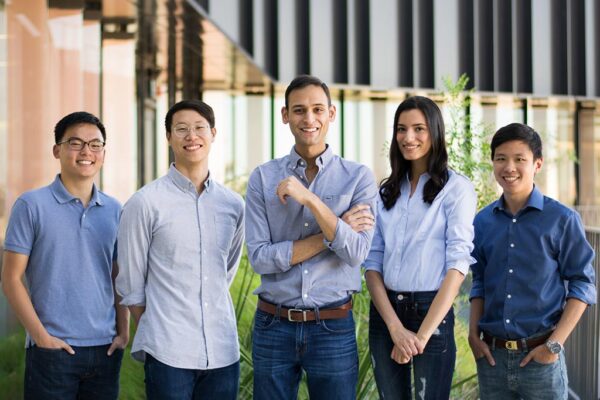When brother and sister Krishan and Koushalya Sachdev witnessed their 23-year-old cousin’s adjustment to life as a paraplegic after suffering a traumatic accident, they wanted to do everything they could to help him.
Three years into his transition, he began suffering from pressure ulcers, which are caused by the prolonged pressing of skin and softer tissue against a harder surface and can happen from sitting in a wheelchair for a long time.
“It wasn’t just one,” said Krishan Sachdev, a recent honors graduate in the Health & Society program at the University of Texas at Austin. “It was one after another after another, and the trauma associated with it allowed us to realize that this problem needed to be solved.”
That’s how the idea for the pair’s health care startup was first formed.
“We actually started brainstorming several years ago about what to do to solve this issue,” said Krishan Sachdev. “However, fast forward a few years and we’re both here, but we hadn’t found the resources to work on it.”
Luckily, with the help of UT’s faculty mentorship and its ample resources designed specifically for innovators, they were able to transform their idea into reality.
Today, the pair are the co-founders of HiPR Innovation, which has secured $50,000 in funding thus far. Since its founding, HiPR Innovation has created a dynamic and reactive cushion that redistributes pressure to prevent ulcers. The startup has received a patent and is currently working on a second submission to the U.S. Patent and Trademark Office.
What makes the startup even more remarkable is that it’s composed entirely of recent UT graduates and current UT students.
“Our team brings a new perspective, a fresh perspective on an issue that’s been there and stagnant for very long,” said Krishan Sachdev, now the CEO of the company.
When just starting out, he said he and Koushalya felt overwhelmed. They needed diverse expertise and turned to UT to find the right team members, he said.
Krishan Sachdev said he emailed professors at UT to help him connect with other students who were passionate about improving the quality of life for patients.
“The majority of the UT professors answered. And so I think that’s a testament to how helpful people at UT have been, and that exemplifies their commitment to doing so,” he said. “It’s been a great experience, and we’re lucky to have the team that we do today.”
The HiPR Innovation team includes Samuel Zhang, a recent electrical and computer engineering graduate in the Cockrell School of Engineering. He works on the hardware technologies that go into the product. In the past, Caton Sun, another UT electrical and computer engineering graduate, helped head the development of software for their products.
Koushalya Sachdev is a supply chain management student in the McCombs School of Business and the chief financial officer. David Chun, a electrical and computer engineering master’s student, is head of engineering with a focus on software and a background in embedded systems.
HiPR Innovation is supported by various UT-affiliated programs and organizations, including Genesis venture capital, SEAL Accelerator, Texas Health Catalyst and Texas Venture Labs, all of which provide support and resources for the company and were “invaluable to HiPR becoming a reality,” Krishan Sachdev said.
He also said that HiPR Innovation has recently joined the Austin Technology Incubator (ATI), a UT-associated tech incubator and also the longest active tech incubator in the United States.
“It’s one thing to succeed in the academic environment, but you eventually need to leave it and make that jump to the real world. ATI does that for us. They have committed to providing experience and mentorship to be able to really transition this from an academic company to a real-world company,” he said.
HiPR Innovation is now anticipating its third and fourth iteration of the prototype and will soon be testing its products in industry, working with physical medicine doctors and rehabilitation patients across Central Texas.
Today work continues, though it is mostly done remotely. “We are so, so grateful to UT and its resources,” said Krishan Sachdev. “We are now eight to 12 months away from hitting the market. It’s super exciting, and we can’t wait to see what the future holds.”




